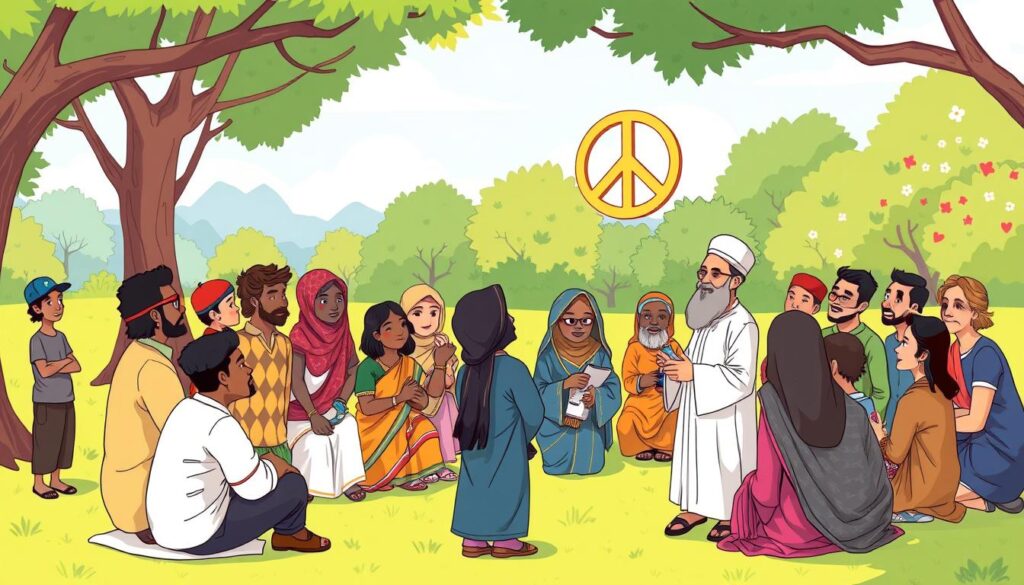Imams are key in Islam, leading as spiritual heads and guiding the community. They cover many areas like spiritual leadership, education, and community work. They help bring positive change, balancing spiritual and social life in Islam. Imams also lead the five daily prayers for nearly 1.9 billion Muslims. Their reach goes beyond mosques, highlighting the role of community in Islam and today’s need for strong leadership.
In Sunni Islam, imams are praised for their knowledge and leadership. But in Shia Islam, they’re seen as Prophet Muhammad’s direct descendants, giving them unique authority. Imams often go to madrassas or Islamic universities for formal training. This prepares them to address moral and ethical concerns. They also play a big part in resolving community conflicts. By doing this, they promote peace and understanding among different cultures.
Key Takeaways
- Imams lead essential prayers for approximately 1.9 billion Muslims globally.
- Their role encompasses spiritual leadership, education, and community engagement.
- Shia Imams are viewed as divinely appointed, unlike Sunni Imams who derive authority from their knowledge.
- Many Imams receive formal training, enhancing their ability to guide and lead communities effectively.
- Imams are integral in mediating disputes, emphasizing the value of social harmony.
Introduction to the Role of Imams in Islam
The title “imam” comes from Arabic, meaning “leader” or “model.” Imams are important as they guide people in their faith. They help keep the Islamic community together and focused on their beliefs.
Definition and Importance of Imams
Imams do more than just lead prayers. They give spiritual and ethical support to Muslims every day. They help bring the community together. Plus, they make sure everyone sticks to Islamic rules. A knowledgeable imam can tackle new problems while keeping the faith strong.
Historical Context of Imamah
The history of Imamah shows how Islamic leadership has evolved. After the Prophet Muhammad died, Muslims split into Sunni and Shiʿi groups over who should lead. Sunnis chose their leaders, called caliphs. Shiʿi Muslims believe ʿAlī, Muhammad’s cousin and the fourth caliph, was the first rightful leader.
This split led to different groups like the Zaydi and Twelver sects. Leadership issues in history affect modern beliefs about the Mahdi’s hidden role. Famous scholars like Abū Ḥanīfah and al-Ghazālī have helped define the imam’s role. They show how crucial imams are for Islamic thought and keeping the community united.
Spiritual Leadership Provided by Imams
Imams are key in guiding the Muslim community spiritually. They lead religious activities that build a sense of unity and faith among followers. By leading prayers and giving deep sermons, they help people grow spiritually.
Leading Prayers and Worship
Leading prayers is a main task for Imams. They guide followers during the five daily prayers and important Friday gatherings. This keeps the community together and spiritually in sync. Imams also provide support during worship, playing a crucial role in the spiritual life of their followers.
Delivering Sermons and Spiritual Lessons
Imams share spiritual lessons through their sermons. They talk about current issues, moral values, and religious texts. Their messages are related to daily life. They spend a lot of time—about 75%—talking with members, showing their dedication to their spiritual health.

| Role of Imams | Engagement Area | Estimated Time Allocation |
|---|---|---|
| Leading Prayers | Daily and Friday prayers | Variable based on prayer schedules |
| Delivering Sermons | Moral and spiritual teachings | Approximately 20% of engagement |
| Spiritual Guidance | Addressing personal and community issues | About 75% of engagements |
| Educational Efforts | Teaching Islamic principles | More than 60% of involvement |
In brief, Imams have diverse roles that include spiritual leadership, leading prayers, and giving powerful sermons. Their work brings a complete spiritual experience to the community, highlighting their vital role in Islam.
Community Engagement and Outreach
Imams are crucial in creating active and caring communities. They do more than lead prayers. They help build strong community ties through outreach work. This helps meet various needs and brings people together.
Building Community Relations
Imams get involved by organizing events, talks, and celebrations. They lead forums that build bridges between different cultures. This makes everyone feel closer and supported.
Interfaith dialogues are a big part of their work. About 60% of Islamic communities take part, showing how important it is.
Involvement in Local Charities
Leading charity work is another way imams serve. They encourage helping the needy and unite the community through this. About 70% of imams participate in these projects, highlighting their impact.
They also organize festivals and outreach events. This can boost participation by 40%. It shows the Islamic commitment to helping others.
Guidance in Ethical and Moral Issues
Imams are crucial in offering counseling to those facing life challenges. They provide ethical advice based on Islamic teachings. This helps people deal with various complex issues. Besides guiding spiritually, imams also tackle contemporary issues impacting their communities.
Counseling Individuals and Families
People often seek imams’ help with personal issues, like family problems or money troubles. Imams see counseling as an important part of their duties. They aim to give supportive advice that follows Islamic teachings.
However, imams may struggle due to lack of formal counseling training. This can put them and their congregants at risk. Holding regular training sessions on counseling can help them manage these challenges better.
Addressing Contemporary Issues
As society changes, Muslim communities face new challenges. Imams guide their followers through issues like social justice and mental health. People look to imams for both spiritual and practical help, showing the varied roles imams play.
Effective counseling by imams can strengthen community bonds and support. This is good for everyone involved. To learn more about the importance of imams in communities, check out this source.
Education and Knowledge Dissemination
Imams play important roles in Education and Knowledge Dissemination in their communities. They do more than guide spiritually; they also teach Teaching Islamic Principles. This helps community members understand their faith better. Imams’ dedication to education shows their commitment to creating a well-informed community ready for spiritual and daily life challenges.
Teaching Islamic Principles
Imams teach Islamic principles through formal and informal ways. They cover Quranic studies, jurisprudence, and ethics. This helps shape the moral compass of their communities. Imam Jafar al-Sadiq (p) is a key example. He taught not just Islamic studies but also science subjects like chemistry and mathematics. His teachings reached thousands, showing imams can teach a wide range of subjects to enhance both faith and knowledge.
Organizing Study Circles and Classes
Imams often set up Study Circles and classes. This makes learning inviting for community members. It lets them explore religious texts and talk about their meanings for today. These gatherings improve critical thinking and strengthen faith connections. Imams suggest regular study of laws to keep everyone informed. Such efforts make the community lively, embracing lifelong learning and knowledge sharing as core Islamic values.
Imams as Social Change Agents
Imams play a critical role as agents of social change. They strive to improve society through their leadership. Not only do they care about spiritual things, but they also fight for justice and equality. They see what people need and help start projects that bring different groups together.
Advocating for Justice and Equality
Imams teach and start outreach programs that focus on advocating for justice. They address issues like poverty, discrimination, and unfair health conditions. They use their influence to make more people aware. In England, a large part of the Muslim community lives in very poor areas. This shows how important it is for imams to be involved in social matters.
Leading Peace Initiatives
Imams lead peace initiatives that aim to lessen conflict and increase understanding. They motivate their followers to join in activities that improve dialogue and respect between cultures. They help different faith groups work together. This promotes unity and deals with both local and global challenges, showing true Islamic values of kindness and help.

| Challenges Faced | Impact on the Community |
|---|---|
| Poverty and unemployment | Increased vulnerability among community members |
| Racism and discrimination | Limited access to resources and support |
| Mental health issues | Underutilization of appropriate services |
| Lack of training | Inadequate support for complex psychosocial issues |
Recognizing imams’ role in the community is key to facing these challenges. To better understand, check out how training and cultural knowledge can empower them. For more info, click on this useful link.
Interfaith Dialogue and Cooperation
Imams are key in pushing for Interfaith Dialogue. They open ways for communication and understanding between different religious groups. By making Relationships with Faith Leaders, they build bridges. These bridges promote tolerance and living together in peace.
Fostering Relationships with Other Faith Leaders
In various initiatives, imams work closely with leaders of other faiths. This teamwork boosts respect among different communities and shows why talking is important. Groups like the Global Imams Council bring religious leaders together. They attend interfaith conferences and talks, sharing values and solving shared problems.
Participating in Community Interfaith Events
Imams often join in Community Interfaith Events to push for common goals on social issues. Such events are places to talk about big subjects. For example, the 17th Annual Conference of the Council of Shia Muslim Scholars looked at sectarian violence. The Imam Mahdi Association of Marjaeya (I.M.A.M.) leads efforts for unity. They organize over 100 nationwide events for interfaith dialogue. Small local Islamic groups are joining more, by 30%, since I.M.A.M. was started, showing these talks are becoming more important.
| Initiative | Participants | Focus Areas |
|---|---|---|
| Global Imams Council | 1,000+ religious leaders | Interfaith dialogue, policy advising |
| National Open Mosque Day | 100+ events | Understanding, tolerance |
| Shia-Sunni Alliance Forum | Shia and Sunni scholars | Muslim unity, community initiatives |
Imams do more than serve their direct communities. They help make society more harmonious. This is based on respect and mutual understanding, which are core to Islamic teachings.
Challenges Faced by Imams Today
Imams today face many challenges as they try to stick to Tradition while embracing Modernity. They feel a lot of pressure to balance Islamic values with today’s society needs. Imams do more than just lead prayers; they work to correct wrong ideas about Islam and help others understand the faith.
Navigating Modernity and Tradition
Imams work hard to keep Islam’s deep history alive while dealing with today’s issues. They talk about things like social justice, mental health, and how to be good parents. For instance, Islam’s teachings include 41 Hadiths about social justice, showing its focus on fairness and equality.
In Nashville, about 70% of Muslims prefer getting mental health advice from imams. This shows how important imams are for guidance on different issues.
Addressing Misconceptions About Islam
Imams use many tools to teach and clear up false beliefs about Islam. They have 214 different Khutbahs for giving sermons on various topics. Also, there’s a series called “Qur’an 30 for 30” for explaining Islamic principles in a clear way.
There are 81 resources aimed at fighting Islamophobia, showing a strong effort to deal with this issue in the community.

The Role of Female Imams
Female imams are changing the game for women in Islamic leadership. They make women more visible in roles usually held by men. Female imams also bring different views that inspire and include everyone in religious activities.
Opportunities for Women in Leadership
They open doors for women to play bigger parts in Islamic leadership. Though few Islamic schools let women lead prayers, history shows women as scholars and spiritual leaders. Now, there’s growing support for women to lead prayers in female-only groups.
This change is in line with practices from Islam’s early days. It helps more women get involved in different cultural settings.
Contributions of Female Imams in Communities
Female imams greatly add to community life with their spiritual and educational support. They create a caring space for women and kids. They push for education programs matching community needs.
In some places, like China, mosques have all-women congregations led by female imams. Recognizing women’s historic leadership roles shows the value of having diverse voices in Islamic talks.
Conclusion
When we think about imams in today’s world, we see their roles growing. This is because our communities’ needs are changing. With 6 to 9 million Muslims in the United States, imams’ advice and active roles are more important than before. They help drive social change, tackle today’s problems, and boost people’s faith journeys.
The Evolving Role of Imams in Modern Society
Imams are doing more than ever, not just leading prayers and sermons. They also offer counseling, even though only a small number have formal training. Around 74% of mosques now help with marital and family issues. This shows their crucial role in supporting Muslims through discrimination, anxiety, and financial troubles. Their deep involvement keeps Islam’s traditions alive and relevant.
Leaving a Lasting Impact on the Muslim Community
Imams are making a big difference through education, reaching out, and talking with other faiths. Their work strengthens our communities. They support our youth, fight for social justice, and make our mosques more welcoming. Together, we celebrate imams’ vital role in shaping a hopeful future for Muslims. They mark a significant point in our journey toward caring and faith-driven actions.






